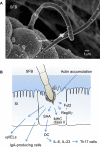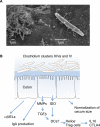The microbiome in infectious disease and inflammation
- PMID: 22224764
- PMCID: PMC4426968
- DOI: 10.1146/annurev-immunol-020711-074937
The microbiome in infectious disease and inflammation
Abstract
The mammalian alimentary tract harbors hundreds of species of commensal microorganisms (microbiota) that intimately interact with the host and provide it with genetic, metabolic, and immunological attributes. Recent reports have indicated that the microbiota composition and its collective genomes (microbiome) are major factors in predetermining the type and robustness of mucosal immune responses. In this review, we discuss the recent advances in our understanding of host-microbiota interactions and their effect on the health and disease susceptibility of the host.
Figures



References
-
- Berg RD. The indigenous gastrointestinal microflora. Trends Microbiol. 1996;4:430–-35. - PubMed
-
- Macpherson AJ, Harris NL. Interactions between commensal intestinal bacteria and the immune system. Nat. Rev. Immunol. 2004;4:478–-85. - PubMed
-
- Bouskra D, Brézillon C, Bérard M, Werts C, Varona R, et al. Lymphoid tissue genesis induced by commensals through NOD1 regulates intestinal homeostasis. Nature. 2008;456:507–-10. - PubMed
Publication types
MeSH terms
Grants and funding
LinkOut - more resources
Full Text Sources
Other Literature Sources
Medical

